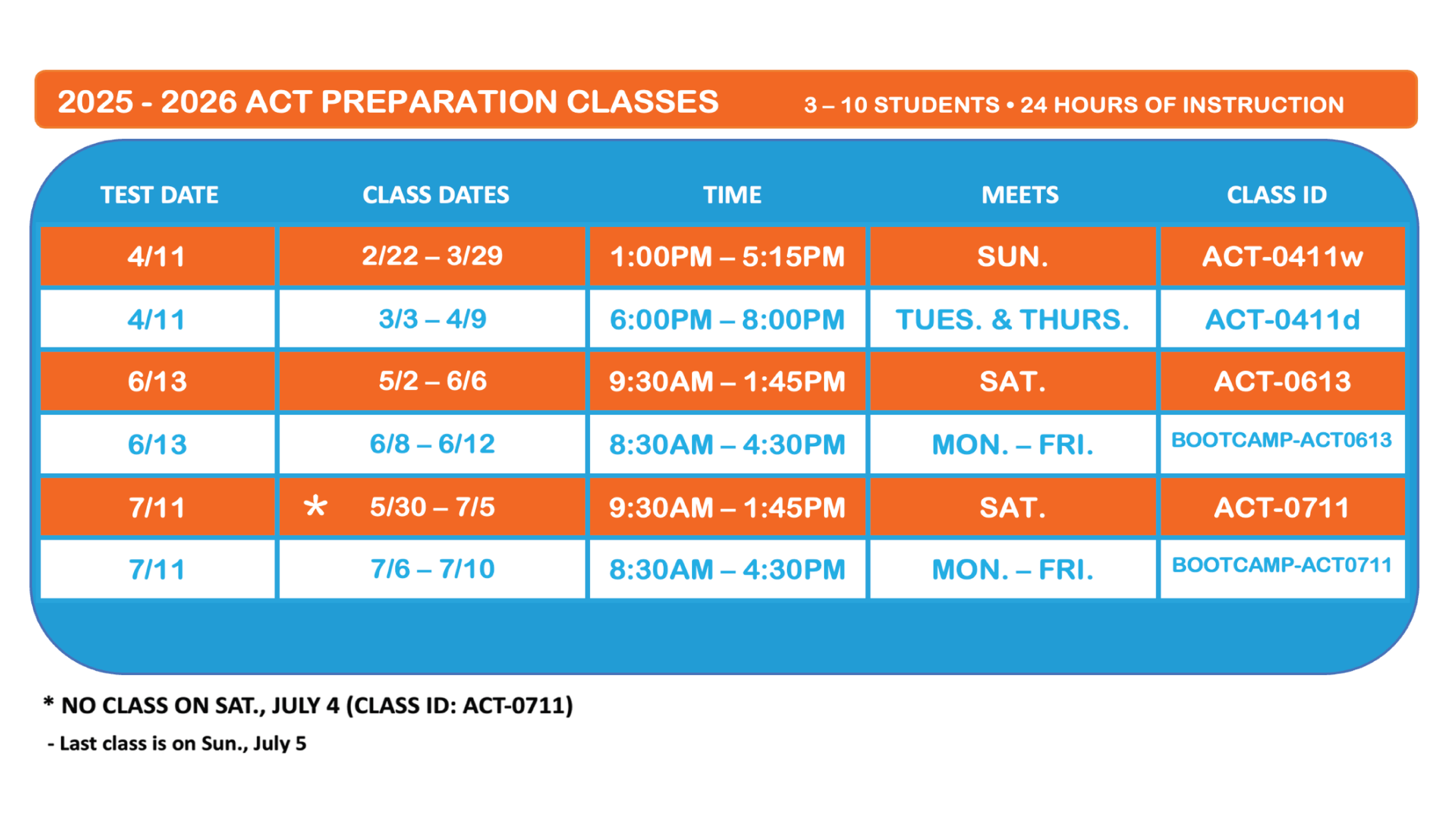ACT Test Prep
The ACT standardized test is designed to assess high school students' general educational development and their readiness to complete college-level work. It is used for college admission decisions and some scholarship qualifications. All US colleges and universities accept ACT results.
When does my student take the test? The ACT is offered at least six times during a given school year. These are usually in September, October, December, February, April, and June. Students generally take the test first during the spring of their junior year. It is best to take it as early as possible, as your student may want to take the test again to get the best score possible.
When and how do I register? A registration packet should be available at your student’s high school, but you may also register online at www.actstudent.org.
Try to register at least eight weeks in advance. The sooner your student registers, the easier it is to get your student’s ideal location. Each test date has its own registration deadlines and locations available.
What is the test's structure? The ACT consists of three mandatory sections: English, math, and reading. Optional science and writing sections are also offered. Here is a more detailed explanation:
The English section is a 50-question, 35-minute test, covering mechanics and rhetorical skills. The test will contain five to six different types of prose passages, each one accompanied by multiple-choice test questions.
The math section is a 45-question, 50-minute test designed to measure the mathematical skills students have typically acquired by the end of their junior year (pre-algebra, algebra I, algebra II, coordinate geometry, plane geometry, and trigonometry.) The questions presented require reasoning skills to solve practical problems in math. Students will be allowed to use an approved calculator but will not be required to perform any extensive computations.
The reading section is a 36-question, 40-minute test that measures reading comprehension. Students are asked to read several passages and answer questions to show understanding of what might be stated or implied in the passages. The test comprises passages that are representative of the reading required in first-year, college-level courses. Passages will cover topics in social studies, natural sciences, prose fiction, and the humanities.
The optional science section is a 40-question, 40-minute test that measures skills required in sciences, such as interpretation, analysis, evaluation, reasoning, and problem solving. The test assumes that students have taken three years or more of high school science courses; however, these courses are not required to ultimately do well in this section. The test presents seven sets of scientific information (graphs, tables, summaries, conflicting viewpoints, etc.), each followed by a number of multiple-choice test questions. Most questions in this section will require critical analysis of the information presented.
The optional writing section is a 40-minute essay test that measures writing skills. An issue is defined and described in a prompt with three points of view on that topic. Students need to take a position on the issue and present it in their essay after analyzing and evaluating all three perspectives provided. Students need to substantiate their own perspective, while explaining the differences between their perspective and those provided.
How is it scored? Each subject (English, math, reading) is scored from 1 to 36, and then the composite score is calculated as an average, with the highest being a 36 overall. The scores are rounded to the nearest whole number. Fractions less than one-half are rounded down; fractions one-half or more are rounded up. Because the ACT science and essay sections are optional, these scores will not affect the overall composite score unless the student has opted to take them. This means it is important for students to research all colleges on their list to determine if a science score is required. Most colleges do not require an essay score, so we typically recommend that students opt out of this section to reduce the overall required time and stress load on official test day.
How many times can I take the test? A student can take the test multiple times without penalties.
What should my student bring to the test? Your student should bring an approved calculator, a snack, pencils, the testing ticket, and a picture ID. Do not bring a phone.
Can I change a date once registered? Yes, life situations may keep your student from being able to meet a previous commitment and, thus, you may need to change a date. The ACT organization will charge a change-date fee.
Can I get a copy of the test? ACT.org provides current schedule of offerings and additional information for ordering a copy of the test: ACT My Answer Key (formerly TIR) | ACT Test Questions & Answers. Unfortunately, they limit their offerings to three test dates per year.
What is the registration schedule for the current academic year and when should I start preparing?
Click here to see our testing calendar - where you will see the ACT test dates for the current academic year. Call us at least 12 to 15 weeks ahead of a test date to get a diagnosis of what is needed for your particular case and to ensure eligibility for one of our classes.
Is the ACT easier than the digital SAT? No. However, here's a better question: “Is the ACT easier or better than the digital SAT for me?" The best way to determine this is to gain experience with the format and content of each test.
Should I take the ACT in addition to the SAT? For most students, that is not a good idea. First, figure out which test is best for you, then focus on that test. Vogel Prep's ACT and SAT assessment is a great place to start.




